|
|
|
Sort Order |
|
|
|
Items / Page
|
|
|
|
|
|
|
| Srl | Item |
| 1 |
ID:
129558
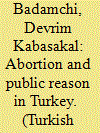

|
|
|
|
|
| Publication |
2014.
|
| Summary/Abstract |
During May and June 2012, the question of abortion was hotly debated in Turkish public forums. This paper analyzes the main characteristics of this abortion debate using John Rawls's conception of public reason as a normative framework. In doing so, speeches and declarations on abortion made by legislators are critically evaluated. The arguments in the debate are examined with a view to interpret how the issue should be discussed as far as the demands of public reason are concerned. From a Rawlsian framework, it is observed that the pro-ban position (Adalet ve Kalk?nma Partisi) is far from contributing to a reasonable balance of political values on abortion whereas the contra-ban position (Cumhuriyet Halk Partisi) satisfies the demands of public reason. Moreover, it is argued that, the latest proposed legislation on abortion cannot be viewed as an outcome of a reasonable balance of political values but is rather an outcome of pragmatic compromise.
|
|
|
|
|
|
|
|
|
|
|
|
|
|
|
|
| 2 |
ID:
190813
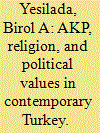

|
|
|
|
|
| Summary/Abstract |
The Justice and Development Party (AKP) came to power in 2002 with the promise of reforms to further democratic consolidation in Turkey. At that time, the AKP represented a rainbow coalition of individuals from the previous Islamist parties and many liberal democrats who were fed up with the failures of old secular political parties. The Turkish public shared their frustrations and overwhelmingly supported the AKP. Unfortunately, these reforms did not last. Today, it is indisputable that under the rule of the AKP, and more specifically, President Recep T. Erdoğan, Turkey has become an authoritarian state defined and shaped by one person. This article explores what these developments mean for the future of Turkish democracy as the country celebrates its centenary, and it includes an examination of whether Turkish political culture is supportive of such changes.
|
|
|
|
|
|
|
|
|
|
|
|
|
|
|
|
| 3 |
ID:
159770


|
|
|
|
|
| Summary/Abstract |
Despite increasing interest in South Africa’s soft power in recent years, little analysis is offered on the factors that hinder the projection of such soft power. Most studies have focused on the sources and the optimization of South Africa’s soft power. While this article gives a synoptic account of these sources, it offers a different perspective by engaging the constraints and contradictions that hinder and circumscribe its soft power projection. The article concludes that, in order to maximize its soft power projection, Pretoria must address the impediments that continue to undermine its power of attraction.
|
|
|
|
|
|
|
|
|
|
|
|
|
|
|
|
| 4 |
ID:
130823
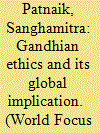

|
|
|
|
|
| Publication |
2014.
|
| Summary/Abstract |
Politics is the most crucial human activity that involves governance. Ethics is the set of principles those regulate the activity of governance and administration. Before we focus on Gandhian Ethics it is necessary to focus on the two schools of thought - Idealism and Realism. Idealism was an approach to international politics based upon liberal assumptions and principles. lt was optimistic as it envisioned a world.in which law, institutions and diplomacy replaced power, competition and use of force. This School was represented 'by St. Simon, Richard Cobden. Aldous Huxley, Russell, Mahatma Gandhi, Wilson and Margaret Mead. It gave emphasis on the role of education and international institutions to bring a better world. It focused on the Positive side of human nature. It proceeded with the assumption that the harmony of the interests was not impossible. Hans J. Morgenthau is the main exponent of realist theory. For him the central focus of realism was power. He de?ned power as "man's control over the minds and actions of other man"(Morgenthau,l993). He emphasized on: lnevitability of conflict among nations, Centrality of Power, Ever -present threat of war.
|
|
|
|
|
|
|
|
|
|
|
|
|
|
|
|
| 5 |
ID:
129208
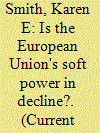

|
|
|
|
|
| Publication |
2014.
|
| Summary/Abstract |
Almost twenty-five years ago, the political scientist Joseph S. Nye Jr. coined the term "soft power" to capture the influence that the United States exercises not through coercion or inducement but through attraction. Coercion and inducement-the stick and the carrot-are forms of command power (or what Nye calls "hard power"), delivered via economic, diplomatic, or military instruments. Command power is used to compel or bribe others to do what you want them to do. Soft power, in contrast, is less a policy instrument to be wielded than an indirect force; it emanates from the attractiveness of a state's culture, political values, and foreign policies. Soft power encourages other international actors to cooperate with a state (or a multistate organization like the European Union) to pursue what they perceive as shared goals and values. It is therefore a less costly means of attaining desired outcomes than the use of command power.
|
|
|
|
|
|
|
|
|
|
|
|
|
|
|
|
| 6 |
ID:
131399
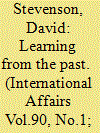

|
|
|
|
|
| Publication |
2014.
|
| Summary/Abstract |
This article is based on an inaugural lecture for the Stevenson Chair in International History, given at the London School of Economics (LSE) in October 2012. It re-examines the origins in Britain in the 1920s of the academic discipline of international history, focusing on the partnership between the LSE and Chatham House. It highlights the differences among the discipline's founders between broader and more tightly defined conceptions of its subject matter and scope, identified respectively with Arnold J. Toynbee on the one hand and with Harold Temperley and Charles Webster on the other. It also underlines the founders' agreement about international history's practical applicability, particularly for analysing and even for helping to prevent the outbreak of major wars. It explores the theme of 'learning from the past' by investigating the interconnection between the diplomatic crises of July-August 1914 and October 1962, reappraising John F. Kennedy's use of history to inform statesmanship. The article points to a recurrent pattern in the international conjunctures of 1914, 1939 and 1962 that may be replicating itself again today. It concludes that a knowledge and understanding of international history can indeed yield insights of practical value, though must be drawn on flexibly and with imagination.
|
|
|
|
|
|
|
|
|
|
|
|
|
|
|
|
| 7 |
ID:
178883
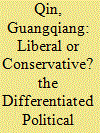

|
|
|
|
|
| Summary/Abstract |
This article analyses data from the 2015 Chinese General Social Survey (CGSS) to investigate the differentiated political values of the middle class in China. Combining the two factors of market situation and institutional division, the article first categorizes several basic types of middle class and then identifies two kinds of political values (liberal and conservative) from the indicators of support for freedom, government satisfaction, and political voting. The results show that the middle class, as a whole, tends to be more liberal than the working class. However, the internal divisions among the sub-groups in the middle class are more obvious – the political tendency of the middle class within the redistribution system is conservative but the middle class sub-groups outside the system, especially the new middle class, have the most liberal tendencies and constitute a potential source for change in China. Thus, the middle class is not necessarily a stabilizer or a subverter of the status quo and has a heterogeneous nature shaped by the dual forces of markets and institutions.
|
|
|
|
|
|
|
|
|
|
|
|
|
|
|
|
| 8 |
ID:
133249
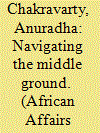

|
|
|
|
|
| Publication |
2014.
|
| Summary/Abstract |
Twenty years after the Rwandan genocide, little is known about the political values of non-elite Hutu. The post-genocide regime has emphasized the problem of "divisionism" and "genocide ideology", suggesting a popular preference for a radical stance on inter-group relations and reconciliation. This argument has been used to defer the question of democracy. This article investigates the attitudes of ordinary Hutu at a rural site, and shows that the respondents staked out a middle ground, emphasizing the shared interests of ordinary Hutu and Tutsi and distancing themselves from the political excesses of both Hutu and Tutsi elites. However, this moderate political space appeared to yield to more radical views when discussing the pressures of transitional justice, when respondents' careful distinction between elite and ordinary people collapsed and a monolithic actor, "the Tutsi", was imagined in conflict with "the Hutu". While this slippage appears to be a coping mechanism in the face of stressful situations rather than an inherent political preference, the article concludes that politically convenient assumptions and maladroit public policy risk contributing to the very dangers the regime claims to combat.
|
|
|
|
|
|
|
|
|
|
|
|
|
|
|
|
| 9 |
ID:
185238


|
|
|
|
|
| Summary/Abstract |
This article explores the correlation between media effects and political trust, as well as the moderating factor in the equation. Specifically, the authors measured political trust within two categories: institutional trust and system trust. Analyses were based on two waves of surveys conducted among Internet users (2014: N = 2,970; 2017: N = 2,379) in China. Results indicated that (1) exposure to official media was positively correlated with political trust, whereas exposure to individual media and overseas media were negatively correlated with political trust, and exposure to commercial media was a nonsignificant factor; (2) correlation was higher for institutional trust than system trust; and (3) political values were a significant moderating factor. Implications are discussed.
|
|
|
|
|
|
|
|
|
|
|
|
|
|
|
|
| 10 |
ID:
120124


|
|
|
|
|
| Publication |
2013.
|
| Summary/Abstract |
The premise of the cultural congruence hypothesis is that the level of congruence between democratic values among the public and in political institutions of a country is an important indication of political stability: the greater the congruence, the greater the stability. Though this hypothesis was proposed almost fifty years ago, it has never been fully examined. A crucial weakness of the hypothesis is that it is blind to the direction of incongruence: instability increases if the public has either more or less freedom relative to their expectations. But based on what we learn from Prospect Theory, one may expect to find different behaviors in these two situations. The empirical analyses that follow confirm this expectation. The article also evaluates the congruence hypothesis in light of the institutional hypothesis. Rather than seeing these hypotheses as competing, the authors claim that it is more productive to focus on the interaction between them, thus improving their understanding of political stability.
|
|
|
|
|
|
|
|
|
|
|
|
|
|
|
|
| 11 |
ID:
178896


|
|
|
|
|
| Summary/Abstract |
This study focuses on the theoretical links between two important ingredients of individuals’ fundamental political values (i.e. authoritarian ideology and national attachment) and their life satisfaction assessments in an authoritarian context. We employ data from a 2016 national public survey in China to empirically examine how these political values relate to Chinese citizens’ life satisfaction. Our regression analyses demonstrate that Chinese citizens with stronger authoritarian ideology and national attachment are likely to report a higher level of life satisfaction. Our study contributes to the existing literature by highlighting the importance of the connections between political values and citizen life satisfaction. It also advances our understanding of the origins of social and political stability in authoritarian regimes, where citizen life satisfaction usually represents a major source of state legitimacy.
|
|
|
|
|
|
|
|
|
|
|
|
|
|
|
|
| 12 |
ID:
128246
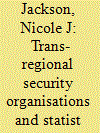

|
|
|
|
|
| Publication |
2014.
|
| Summary/Abstract |
This paper argues that there is an emerging trans-regional security complex reaching from Russia through Central Asia to China. Shared security norms have resulted in statist multilateralism, that is, state-directed cooperation on shared interests while closely guarding distinct identities and specific political features. The paper outlines member states' key political values and shows how they 'framed' shared understandings about security. It then explains how security norms inform the institutional designs of the two main multilateral security organisations thereby directing the nature of cooperation, testing the argument in two key conflicts: in Kyrgyzstan and Afghanistan.
|
|
|
|
|
|
|
|
|
|
|
|
|
|
|
|
| 13 |
ID:
131017
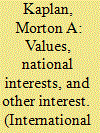

|
|
|
|
|
| Publication |
2014.
|
| Summary/Abstract |
This article examines the concept of "national interest," from its common use in policy circles to the network of subordinate and superordinate interests in which a state is situated. When analyzing the interest of a social system, like a state, it is important to take into account the level of governance and the interests of the individuals and subsystems upon which the system depends, and consider the value of serving other members in federations, alliances, and blocs even at sacri?ce to itself. A systems approach to politics enables tl1e international relations professional to transcend the problems often encountered by the subjective use of raw power for perceived national interests that fail to accurately anticipate unintended consequences.
|
|
|
|
|
|
|
|
|
|
|
|
|
|
|
|
| 14 |
ID:
113307


|
|
|
|
|
| Publication |
2012.
|
| Summary/Abstract |
Twenty years after German reunification, surveys have persistently uncovered differences in political trust between the eastern and western parts of the country. Studies have offered disintegrated and inconclusive assessments of the cross-regional variation. This variation is traced to a tenacious, retrospective sympathy for socialism steeped in political socialisation and experiential learning. Empirical analyses confirm the presence of two key effects. First, retrospective evaluations of socialism not only fuel popular distrust of political institutions, but are more strongly correlated with trust in the east. Second, East-West evaluations of socialism are sufficiently different to contribute towards explaining the contrasting levels of trust between the two regions. That socialist values constitute a core axis upon which East German attitudes pivot presents a challenge for nurturing trust in democratic institutions and renews attention to processes through which supportive attitudes to democracy are acquired in transitional countries.
|
|
|
|
|
|
|
|
|
|
|
|
|
|
|
|
|
|
|
|
|